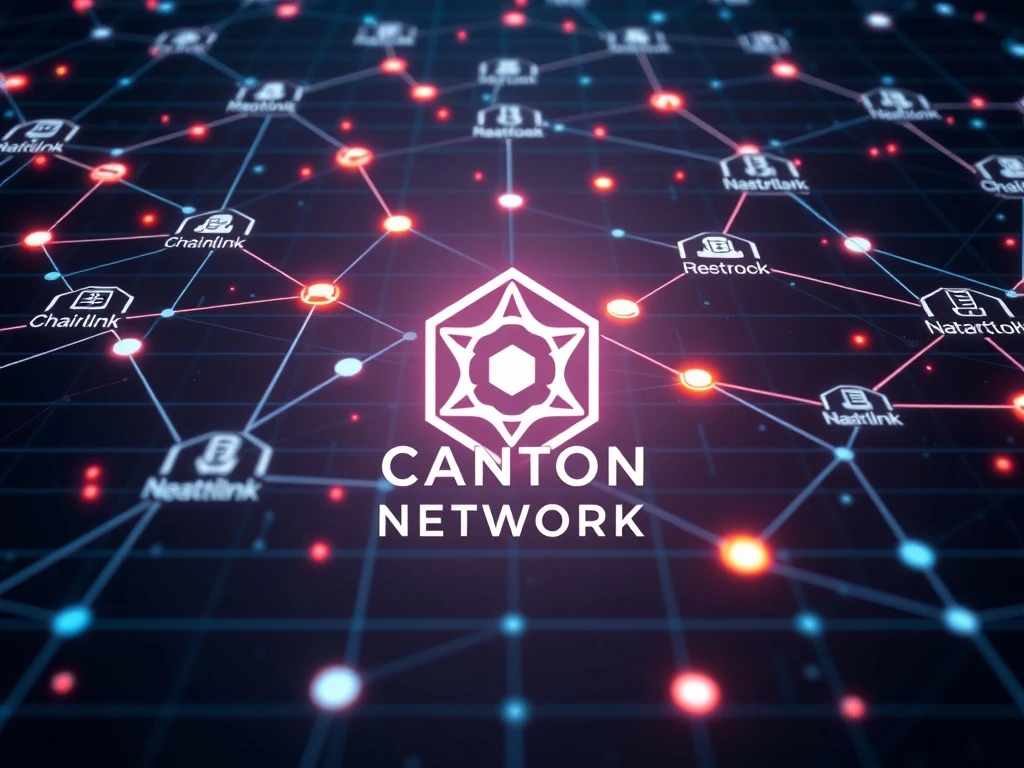Canton Network Unlocks Strategic Partnership with Chainlink, Boosting Institutional Blockchain Adoption

The financial world is witnessing a profound shift. Traditional finance and decentralized technology are converging at an unprecedented pace. At the forefront of this evolution is the **Canton Network**, an institutional blockchain designed for large-scale financial activities. A pivotal development recently occurred: Chainlink, a leading oracle network, announced a significant **Chainlink integration** with Canton. This collaboration is set to revolutionize institutional blockchain capabilities, further cementing the role of blockchain in global finance. It promises to unlock new efficiencies and opportunities across capital markets.
Chainlink Integration: A Strategic Move for Institutional Blockchain
Chainlink has seamlessly integrated its robust data services and cutting-edge cross-chain protocol into the **Canton Network**. This crucial move positions Chainlink as a key player within the institutional ecosystem. Furthermore, Chainlink has officially joined Canton as a **super validator**. This partnership aims to strengthen the foundational infrastructure supporting institutional adoption of blockchain technology.
The **Chainlink integration** brings several vital components to the Canton Network:
- Data Streams: These provide reliable, real-time data feeds essential for complex financial applications.
- Smartdata Services: This includes Proof of Reserve and NAVLink, offering verifiable data for critical financial assets.
- Cross-Chain Interoperability Protocol (CCIP): CCIP enables secure and reliable cross-chain communication. This allows institutions to transfer tokens and data across various blockchain networks, fostering greater liquidity and connectivity.
Chainlink Labs also joined the Chainlink Scale program. This program helps offset oracle operating costs. This ensures the sustainability and efficiency of these critical services on the Canton Network.
Understanding the Super Validator Role and Canton Network’s Vision for RWA Tokenization
Chainlink Labs’ new role as a **super validator** is significant. A super validator operates as a combined node. It runs both a domain validator and a Canton synchronizer node. This dual function allows it to participate in the Global Synchronizer. The Global Synchronizer orders and finalizes cross-domain transactions. This process provides crucial consensus and interoperability across the entire network.
Yuval Rooz, CEO of Digital Asset, the developer behind the Canton Network, highlighted the impact. He stated, “Chainlink not only strengthens our governance and resilience, but also broadens the opportunities for innovators across traditional and decentralized finance.” Sergey Nazarov, Chainlink co-founder, echoed this sentiment. He anticipates the collaboration will enable “large-scale real-world use cases.” These use cases will effectively combine traditional and decentralized capital markets.
Launched in May 2023, the **Canton Network** was specifically designed as an **institutional blockchain**. Its primary purpose is to support advanced tokenization and large-scale financial activity. It boasts a powerful consortium of backers. These include tech giant Microsoft, financial heavyweights Goldman Sachs, BNP Paribas, and Cboe Global Markets, alongside crypto-native firms Digital Asset and Paxos. The network’s governing body, now rebranded as the Canton Foundation, includes major validators like Chainlink. This rebranding reflects a clearer purpose, connecting the Foundation’s work more directly with the Canton Network.
Expanding Reach: The Impact of Super Validators and Ecosystem Growth
The **Canton Network** has experienced remarkable growth since its inception. This is largely due to its influential partners and robust infrastructure. The network now supports over $6 trillion in on-chain real-world assets (RWAs). It processes an impressive $280 billion of repurchase agreements daily. This demonstrates its capacity for high-volume, critical financial operations. The network is also supported by a vast ecosystem. It includes 500 validators and over 30 **super validator** nodes, ensuring decentralization and resilience.
Recent reports further underscore Canton’s expanding influence. P2P.org recently became a validator on the network. Additionally, major global banks BNP Paribas and HSBC joined the Canton Foundation earlier this month. These developments signify a growing confidence in the Canton Network’s ability to facilitate institutional-grade blockchain solutions. The focus on **RWA tokenization** remains a core driver. This allows traditional assets to be represented and managed on a blockchain, offering enhanced liquidity and transparency.
Accelerating Institutional Blockchain Adoption: A Global Trend
The **Chainlink integration** with the Canton Network arrives amidst a global acceleration of blockchain initiatives by financial institutions. This week alone has seen several significant developments:
- Ripple and tokenization platform Securitize integrated the Ripple USD (RLUSD) stablecoin. This serves as an off-ramp for tokenized funds from major crypto investment firms like BlackRock and VanEck.
- London-based Fnality secured $136 million from prominent backers. These include Bank of America, Citi, and Temasek.
- Kazakhstan’s central bank piloted a tenge-backed stablecoin. This initiative leveraged Solana and Mastercard technology.
These examples illustrate a clear trend: global finance is embracing blockchain technology for various applications. From stablecoins to tokenized assets and cross-border payments, the benefits of efficiency, security, and transparency are undeniable. The **Canton Network**, with its enhanced **Chainlink integration** and growing roster of institutional partners, is well-positioned to lead this charge. It is paving the way for a future where blockchain is an indispensable part of the global financial architecture. The focus on **RWA tokenization** continues to gain momentum. This will reshape how assets are owned, traded, and managed globally. The role of **super validator** networks, ensuring integrity and interoperability, will become increasingly critical in this evolving landscape.







